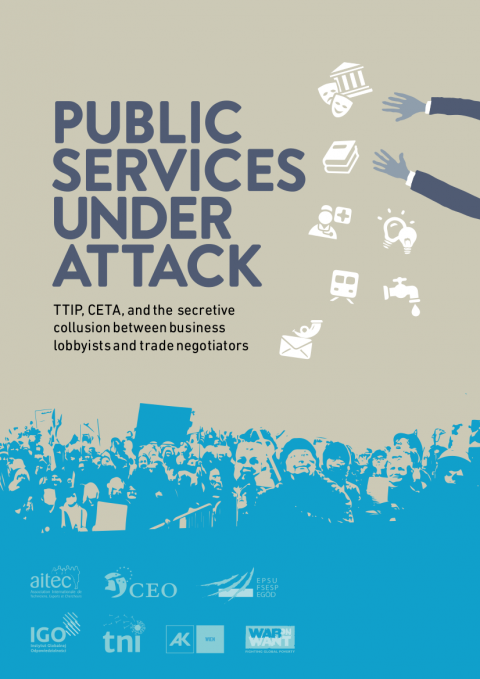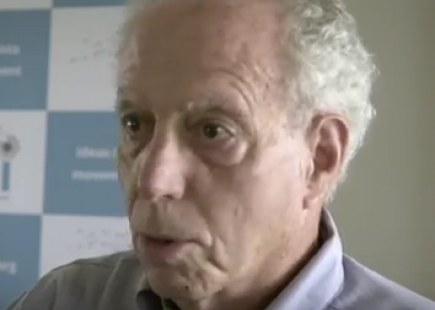Video: How do corporations want to run the world?
Harris Gleckman summarises the Global Redesign Initiative that has come out of the World Economic Forum and represents the best summary of corporations' vision of what they want global governance to look like. Read more »
Video: Shadow Sovereigns - Susan George
Renowned scholar activist Susan George explains why her new book Shadow Sovereigns - How Global Corporations are seizing power is critical information for activists committed to fighting injustice. Read more »
A timeline that tells the story of Colombia's aerial eradication programmes that have sprayed chemicals to combat illicit crops, particularly coca, for more than 37 years. View the timeline »
Edgardo Lander argues that Venezuela's once-hopeful revolution is coming to an end, because it failed to overcome the Leninist logic of verticality as well as the model of the rentier state. Read more »
Daniel Chavez
What does the concept of energy democracy offer to the struggle against climate change and energy poverty? Read more »
The Institute for Policy Studies and Transnational Institute welcomed the U.S. Department of State's declassification of documents that confirmed Pinochet's involvement in the assassination of TNI's second Director and an IPS colleague. Read more »
The World Bank's failure to improve rural livelihoods, reduce rural poverty, end rural hunger and build climate resiliency is based on its long-held, faulty assumptions regarding both agriculture and development. Read more »
The Moral Case Against the TPP Manuel Perez-Rocha
Bombing Hospitals All in a Day's Work Phyllis Bennis
China's stock market crash: Symptom of a bigger crisis Walden Bello
Investing for Development?
Open Letter: Threats in Colombia to social movements remain a serious concern
Feiten & fabels over TTIP Dutch
Cannabis policy in the Czech Republic Tereza Filipková
Indonesia and the New War on Drugs
Statement of 3rd Myanmar Opium Farmer Forum
Corbyn: the non-careerist politician Boris Kagarlitsky
En español Las convenciones de drogas de la ONU
Esta guía, basada en diez años de investigación, ofrece una valiosa introducción a las convenciones de control de drogas de la ONU, explicando su historia, alcance e impacto en las políticas de drogas de todo el mundo y, ahora que se aproxima la importante UNGASS de 2016, las diversas opciones que existen para reformar los tratados. Leer más »
El significado, la pertinencia y el alcance de la democracia energética
¿Qué aporta el concepto de la democracia energética a la lucha contra el cambio climático y la pobreza energética? Leer más »
Arquitectura de impunidad
Los crímenes corporativos no se deben a "unas pocas manzanas podridas" en la cesta corporativa, sino a una arquitectura de impunidad y una estructura de poder que prima los derechos corporativos sobre los derechos humanos. Leer más »
El huracán Katrina marcó un hito al desenmascarar cómo los Estados democráticos empiezan a tratar las crisis sociales y ambientales como una cuestión de seguridad en vez de un asunto de justicia social. Esta visión de la 'Seguridad Nacional' domina ahora nuestra respuesta política a los efectos del cambio climático. Leer más »
El mecanismo de solución de controversias entre inversores y Estados incluido en el ambicioso acuerdo de integración económica entre Canadá y la Unión Europea impide que los Gobiernos actúen en el interés público. Leer más »
Aunque en Colombia se habla de paz, no existen garantías para la actividad de organizaciones sociales que defienden sus derechos y se oponen a un modelo económico que profundiza las desigualdades y viola los derechos fundamentales. Leer más »
Los cultivadores de opio y los representantes de las comunidades de agricultores de opio se reunieron en septiembre de 2015 para hablar sobre las políticas de drogas que afectan sus vidas y plantear recomendaciones. Leer más »
La política de drogas del Ecuador presenta contradicciones. El mismo gobierno que redujo las penas para diferenciar a los pequeños traficantes ahora propone el aumento de las sanciones. Leer más »
Transnational Institute — putting ideas into movement since 1974
Subscribe to TNI Newsletters |



